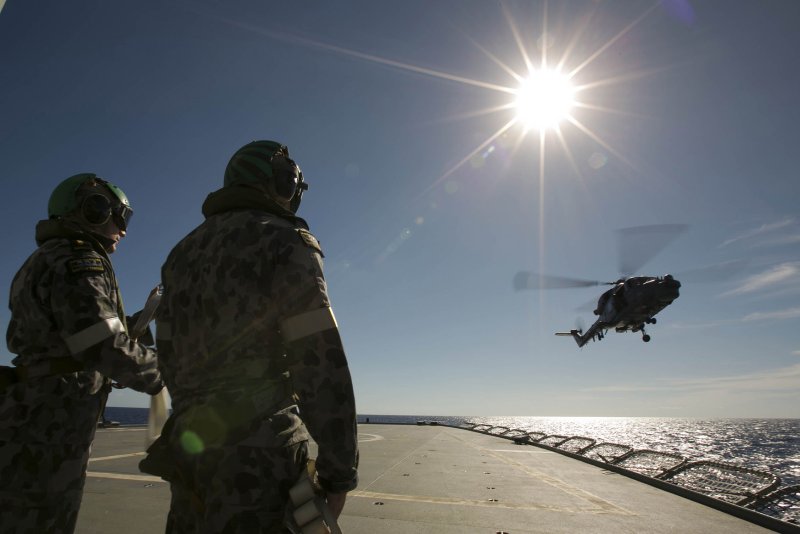Crew members aboard an Australian naval ship for Malaysia Airlines Flight 370 in the Indian Ocean on April 7, 2014. Tuesday, investigators said it's unlikely the captain of the flight deliberately crashed the Boeing 777. File Photo by David Connolly/Australian Defense Force/UPI |
License Photo
May 22 (UPI) -- Australian investigators told lawmakers Tuesday it's unlikely the pilot of Malaysian Airlines Flight 370 was conscious and deliberately crashed the plane four years ago, as has been claimed by experts recently.
A group of international experts concluded last week the pilot of the missing Boeing 777 probably made a deliberate descent into the Indian Ocean in March 2014 during a flight from Beijing to Kuala Lumpur.
Canadian air crash investigator Larry Vance said MH370 Capt. Zaharie Ahmad Shah made a intentional decision to crash the aircraft.
"He was killing himself; unfortunately, he was killing everybody else on board, and he did it deliberately," Vance said.
The experts added that Shah probably cut off oxygen to the passengers and used his emergency air supply to continue flying the jetliner.
Greg Hood and Peter Foley of the Australian Transport Safety Bureau, though, told a Senate hearing Tuesday it's likely Shah still would have been incapacitated by decompression sickness -- particularly in view of how long the plane continued to fly after dropping off radar.
"Most of the people out there are speculating about a long period of depressurization after the transponder went off," Foley said.
"What they fail to understand is that while you don an oxygen mask and prevent the worst of the hypoxia situation, you are flying an aircraft at 40,000 feet. ... You'll get decompression sickness too."
Foley told lawmakers the plane probably crashed into the ocean because it was out of fuel.
"There's no earthly reason why someone in control of an aircraft would exhaust its fuel and then attempt to glide it when they have the option of ditching," Foley added, saying the ATSB has "a lot of evidence" to support that the pilot had "no control in the end."
Foley added that Shah was overweight and roughly the same age as another pilot who became incapacitated by decompression sickness in a similar 1994 plane crash.
"The pilot in this particular aircraft was 51 and overweight," Foley said of the 1994 crash. "The pilot in command of MH370 was 53 and overweight. I'm not saying that happened and I hate to speculate, but that is one plausible scenario."
Searchers looked for years for the missing Boeing 777 but have never found the crash site. Pieces of debris that are believed to have come from MH370 have washed up on African shores, though. All 240 passengers and crew are presumed dead.















